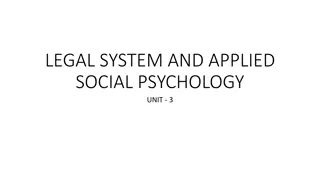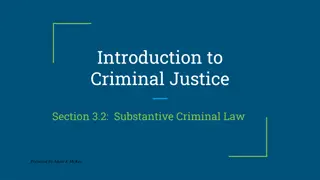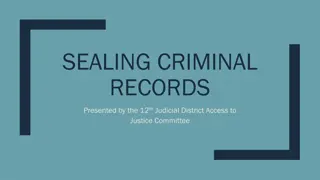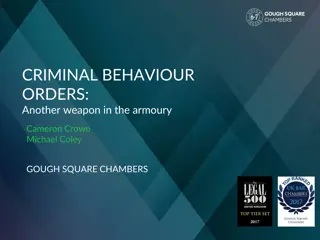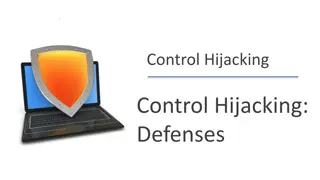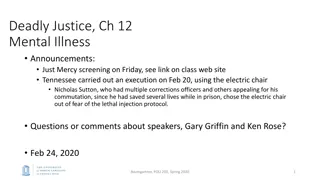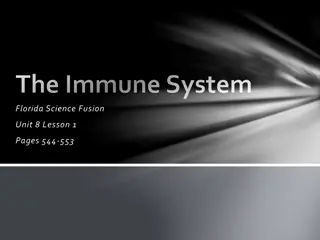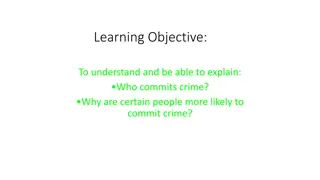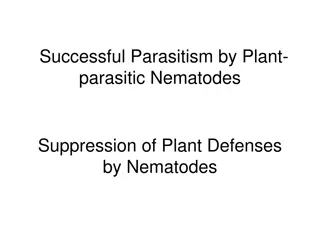Criminal Defenses and Legal Concepts
Explore the intricate realm of criminal defenses, from Mens Rea to Actus Reus, and delve into various defense strategies such as alibi, excuse defense, defense of self, property, and others. Uncover the nuances of legal concepts like infancy and not criminally responsible excuses in the context of criminal law.
Download Presentation

Please find below an Image/Link to download the presentation.
The content on the website is provided AS IS for your information and personal use only. It may not be sold, licensed, or shared on other websites without obtaining consent from the author.If you encounter any issues during the download, it is possible that the publisher has removed the file from their server.
You are allowed to download the files provided on this website for personal or commercial use, subject to the condition that they are used lawfully. All files are the property of their respective owners.
The content on the website is provided AS IS for your information and personal use only. It may not be sold, licensed, or shared on other websites without obtaining consent from the author.
E N D
Presentation Transcript
Crime Crimes are made up of ELEMENTS The thinking part of the crime is the MENS REA Almost every crime requires a Mens Rea of INTENT The action part of the crime is the ACTUS REUS
First Defense Prosecution fails to prove: 1. Criminal Act 2. Criminal Intent
Second Defense The defendant can prove she wasn t the one: 1. Alibi 2. DNA evidence
Alibi Latin word that means elsewhere An excuse or plea that a person was somewhere else at the time a crime was committed.
Excuse Defense Defendant admits to committing a criminal act but believes that he or she cannot be held responsible because there was no criminal intent
Defense of Self, Defense of Property, Defense of Others Must believe that there is an imminent danger of bodily harm The defender may only use a necessary amount of force After stopping the attacker, the defender must stop using force otherwise, the roles reverse! (see point #1) Reasonable nondeadly force can be used for protecting property Police officers can only use deadly force under a significant threat of death or bodily harm to the officer and others
Infancy The legal defense of a person considered not yet legally responsible for his or her actions The time before which a person becomes entitled to the legal rights and responsibilities normally held by citizens
Infancy Infancy is not a defense in Juvenile Court. Why?
Intoxication A state of drunkenness or similar condition created by the use of drugs or alcohol Voluntary Intoxication is not a defense
Insanity Because of mental disease or defect, the defendant should not be held responsible for the crime committed Standards Defendant does not know the difference between right and wrong The Defendant lacks the substantial capacity to appreciate the nature of the act OR conform to the requirement of the law
Justification I did it but I was justified
Entrapment Defendant admits to committing the criminal act, but claims that he or she was induced, or persuaded, by law enforcement to commit a crime they otherwise would not have committed Does not apply to crimes involving serious physical injury.
Duress Unlawful pressure on a person to do something that they otherwise would not do. Claim that defendant lacks the ability to exercise free will.
Necessity A defense to a criminal charge that shows a just and lawful reason for the defendant conduct Never a defense to homicide
Lets Play Ms. Smith keeps a handgun in her home as protection. One evening she hears a noise and goes to investigate. Upon entering the family room, she sees a man stealing her television. The burglar sees Ms. Smith and her Smith and Wesson and runs for the window. Ms. Smith shoots and kills the burglar before he can escape.




